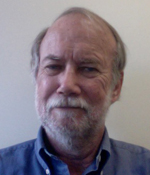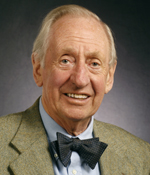Today’s Plenary Session “Lessons from My Journey” from 11:30 a.m. to 1 p.m. in Room 6 A (Upper Level) San Diego Convention Center will feature the extraordinary stories of Paul Quinton, PhD, and John West, MD, PhD, both of the University of California, San Diego School of Medicine.

Paul Quinton, PhD
Dr. Quinton is the Nancy Olmsted Professor in Respiratory Medicine in the Department of Pediatrics and runs an eponymous laboratory in cystic fibrosis and obstructive airway research. His lab examines the roles of fluid, electrolyte, and mucus movements of epithelia in cystic fibrosis and other obstructive lung diseases.
By applying electrophysiological, imaging, micro-manipulation, molecular biological and biochemical approaches, Dr. Quinton and his team investigate the mechanisms of normal and pathophysiological functions in affected epithelia. Their studies have included sweat gland, airway, reproductive, and gastrointestinal intestinal organs with an emphasis on native tissue ex vivo.
For Dr. Quinton, cystic fibrosis is more than a research interest, it’s a reality. At age 19, Dr. Quinton was diagnosed with cystic fibrosis, which set him on a lifelong journey to better understand the disease and develop life-changing therapies. Using himself as a subject, he discovered the basic chloride channel defect.
“What drives us all is the challenge of trying to do what has not been done, to know what has not been known in attempts to answer questions that are never fully answered,” Dr. Quinton says, “but finding just a piece of an answer breeds a zealot’s faith that another piece will be found until we actually can and will come to an understanding. For me, those moments of discovery are unparalleled rewards.”

John West
Dr. West, a distinguished professor of medicine and physiology, is a pioneer in the study of high-altitude physiology and medicine. Dr. West took part in legendary mountaineer Sir Edmund Hillary’s 1960 Silver Hut Expedition, in which Dr. Griffith Pugh led a group of scientists to study the physiology of acclimatization at extreme altitude over a prolonged period in the Himalayas.
After the experience, Dr. West was fascinated in high-altitude medicine and physiology, and his enthusiasm culminated into the 1981 American Medical Research Expedition to Everest, a mountain that famously boasts an elevation of 29,029 feet. Five people reached the summit, and the first physiological measurements on the summit were made.
“Extreme altitude such as that at the summit of Mt. Everest is of great medical and physiological interest because the low level of oxygen in the air is right at the limit of human tolerance to oxygen deprivation,” says Dr. West, whose book Respiratory Physiology: The Essentials, which was published in 1974, has been translated into 13 languages and is used all over the world. “At the present time, many people reach the Everest summit on commercial expeditions but they all breathe supplementary oxygen. Only a few people have reached the summit without added oxygen. The main physiological adaptation that enables humans to go so high is the extreme hyperventilation which drives the alveolar PCO2 down to less than 10 mm Hg. This results in an extreme expiratory alkalosis which is of interest because this increases the oxygen affinity of hemoglobin and helps in the loading of oxygen in the pulmonary capillary.”
Dr. West’s research led him to NASA to study pulmonary function in astronauts, and his experiments were conducted on four Spacelabs in orbit and on the International Space Station.
“Our interest in studying astronauts in microgravity stems from the work that we have done on the effects of gravity on the lung,” Dr. West adds. “The lung is enormously influenced by gravity which causes regional differences of blood flow, ventilation, alveolar size, and mechanical stresses. As a result, lung function is changed in space but fortunately adequate gas exchange continues. It is unlikely that lung problems will be serious on long-term space missions such as to Mars.”
Don’t miss Drs. Quinton and West speak during the Plenary Session today.
